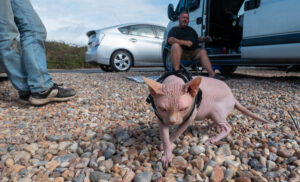Three hours after landing at Heathrow, I was in Chaplins, just off Dover’s Market Square, 15 yards from a sign proclaiming: “Here while searching for his Aunt Betsey Trotwood, David Copperfield rested on the doorstep and ate the loaf he had just bought.” I was not eating a loaf, but instead a bland English breakfast, served to me by a kind Czech woman, cooked by a very gruff Romanian man. Surrounding me, were broken Brits.
There was the hunchbacked man with a pork dinner; the woman in a motorised wheelchair eating sticky toffee pudding; and the obese man stuffed into a far-too-small football kit, working on a nut roast and strawberry shake. Outside, in Market Square, the only thing going on was a showdown between two addicts, “John’s a lying cunt” and “Wendy’s a fucking a fat whore”. I started on team John but quickly pivoted to team Wendy, when John insisted he hadn’t punched the guy we all just saw him punch.
I had planned on staying in Dover for two nights, but by the time the police came to take John away, it was clear I’d been fooled by decades of tourist board propaganda. Here was a scrappy, poverty-riddled port town struggling to live up to its historical hype. An essential node in modern life where motorways intersect next to a huge port, allowing us to have the stuff we have.
I thought about giving up on Dover and going to sleep, but first I went to Wetherspoons. There, I met Sandra. Or as she wrote in my phone, Sandra Puta. Since I’ve spent time in Brazil and the Bronx, I recognised this as confirmation of what was already pretty clear — she was for sale, or rent at least.
Sandra had come into the Wetherspoons 20 minutes earlier and methodically worked her way through the tables of men, none of whom wanted the problems she was selling. It was a buyer’s market anyway, since there were plenty of younger, blonder options nearby. Some were accompanied by both their newborns and their mothers, so that the latter could act as impromptu babysitters if their daughters got work. Three generations at one table.
Sandra was originally from Brazil, she told me, but had been making her way through the EU, using refugee status to get what she wanted. She’d arrived in Dover a few months ago, using what she called her “Pussy Passport” to gain a long-term visa, a flat to bring men back to, and the £170-per-week payment offered to victims of human trafficking. She alternated between talking to me and FaceTiming a man who could have been her dealer, her pimp, her boyfriend, or any combination of the above.
She wasn’t shy about any of this — what she did, or the bullshit she told the bureaucrats. Her honesty was disarming. I’m used to deflection, but she was upfront about everything, including what she currently wanted, which was more money for crack. I made it clear I wasn’t going to help her with that. We talked for about two hours, before I left to get some sleep. The next day, I would begin my week-long walk to Portsmouth. When I woke at 5am, I had over 20 missed calls, because addicts be addicts, no matter how smart, genuine, and interesting they are.
When I planned my trek along England’s South-East coast, I had images of boardwalks crowded with arcades, high streets chock full of fish and chip shops, and town centres of ancient churches and quaint inns above pubs. I wasn’t prepared for how populated the beaches themselves would be. Despite being an island, England isn’t thought of by us Americans as having a beach culture, perhaps because in reality it’s so ingrained — the literal and figurative water everyone swims in. It’s a good attitude, which I prefer to the American one of “let’s invade the beach for a few hours with loads of paraphernalia”. The coast to the British is more about long-term therapy and less about immediate pleasure — it has to be, given the climate.
The result is the British, more than most, want to live close to the coast, even if they don’t ever swim in the water, even if it means giving up a larger house with space. The shoreline, even in the most remote parts, is dotted with trailer parks and clusters of RVs, tents, and vans — some right on the beach, others off in the hills with only a view of the ocean, but all gaining value by their proximity to the sea. Wherever in England there is the right to settle near the coast, people settle; sometimes they even settle where there isn’t the right.
Somewhere between New Romney and Rye, I met Mark, who lives with his furless cat in a van in a squatters’ camp. The pebbled land is owned by “some rich guy in Thailand who doesn’t give a fuck about us”. He claims it is one of the few remaining plots on the southern coast that hasn’t been taken away by “them fuckers in the government, or the rich”. It is a self-policing year-round community of about 100 people — most retired, on the dole, working odd day jobs, or all of the above. I’d seen other squatter communities along my walk, but none as well-organised.

Many of the beaches I walked along between Dover and Worthing were the sad pebble and concrete beaches that Americans picture when they feel sorry for the British. They are rocky, cold, misty, mercurial — but they are busy, which fits with the rather passive English attitude toward life: people making the best of what they have and accepting things as they are, rather than trying to change them. This is how it is; this is how it’s always been.
These beaches fit what I call the British “Extra Rolo Culture”. When I worked in London in the late Nineties, the buses all had huge ads proudly announcing that a roll of Rolos now came with an extra Rolo. Eight, not seven, baby Rolos per Rolo litter. For me and my banker friends, it came to represent the material sadness of English life, compared to the US. You might have a stagnant GDP, a crumbling empire, rock-filled beaches, soggy and tasteless food, rainy and dreary weather, but don’t despair: here’s an extra Rolo!
At the time my personality was peak Wall Street and I viewed everything in economic terms, and by that measure England is something to be laughed at or pitied. That hasn’t changed in the last three decades; if anything it’s worse. The seaside towns I have walked through are a good example. I’m typing this in a pub where almost nothing works, after spending three nights in three different hotels where almost nothing worked. Where showers are either scalding hot or freezing cold. Where, when the weather turns a bit warmer than usual, people treat ice likes it’s some magical thing that can’t be accessed. Not without offending the Gods. Where everything is small, sad, half-broken and dreary.
Since then, I’ve changed. I get the extra Rolo thing now: it is about moving beyond the material, accepting what you have, which is perfectly fine, and focusing on other things. Sure, you can splurge every now and then, spoil yourself with an eighth Rolo, as a lark, but that’s not the primary point of happiness. From what I’ve seen and heard in my two long walks across England, the English working class is a lot happier, more comfortable in their own skin and content, than the American. They might suffer from many of the same problems, but they seem a lot less angry.
While there’s a lot of reasons for this, I think the main one is, ironically, that the class system is more calcified. In the US there’s this fantasy that anyone can do anything. The elites peddle this all the time: with enough hard work you can be whatever you want to be. The corollary to that is it’s not ok to be working class. You should always be looking to move on, rather than building your own culture. Divorce your class and be better, you loser!
In the UK, the knowledge that you are stuck in your class is actually freeing. The attitude shifts from constantly trying to distance yourself from your community to contributing to it. Or at least being happy with it. Because fuck the elites and their scorn. I’m never gonna be them, so I’ll be what my dad was and my dad’s dad was.
The result of this is the British seem like a wind-up toy that bumps over and over into a wall, but with a smile on its face. As a former banker, and an American driven to optimism, my first reaction is to find that annoying. But a decade removed from my banker days, I now see things in less material terms. I believe the biggest contributor to happiness is not having tons of stuff, but knowing your address in the universe of meaning. Knowing who you are, and why you’re here, and what will come once you’re gone.
The English working class has that. It is eating mushy fish on pebbly beaches, then heading off to the local for a pint of bitter. That’s the difference between Dover and all the places in the US I’ve visited. They both have addicts — both have people like Sandra who are gaming the system — but in Dover, despite all the dysfunction, despite very little working, there is far more happiness than in the Bronx, or West Virginia.
Chaplins, despite all the visible unhappiness, is a happy place. Everyone that came in knew everyone else, including lying John, and understood them. They knew where they were coming from and what they were going through. Because England, even the “worst” parts, still has a real community, built around a shared history and culture; even if it sometimes gets turned into tourism board silliness, it very much matters. The English know who they are, and are ok with it. That they also got an extra Rolo every now and then is the cherry on the top.
Disclaimer
Some of the posts we share are controversial and we do not necessarily agree with them in the whole extend. Sometimes we agree with the content or part of it but we do not agree with the narration or language. Nevertheless we find them somehow interesting, valuable and/or informative or we share them, because we strongly believe in freedom of speech, free press and journalism. We strongly encourage you to have a critical approach to all the content, do your own research and analysis to build your own opinion.
We would be glad to have your feedback.
Source: UnHerd Read the original article here: https://unherd.com/




